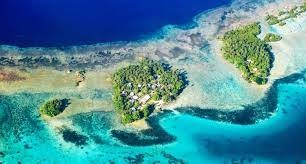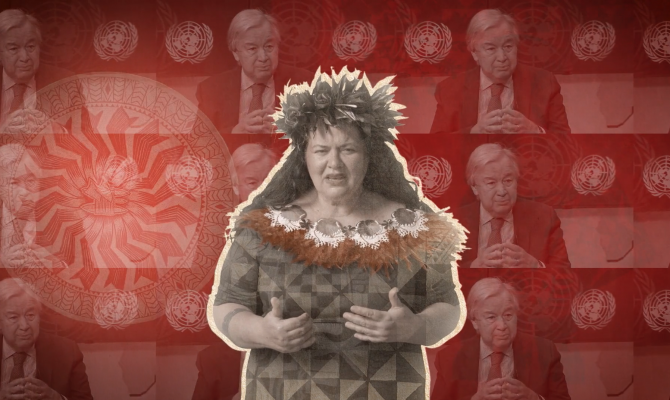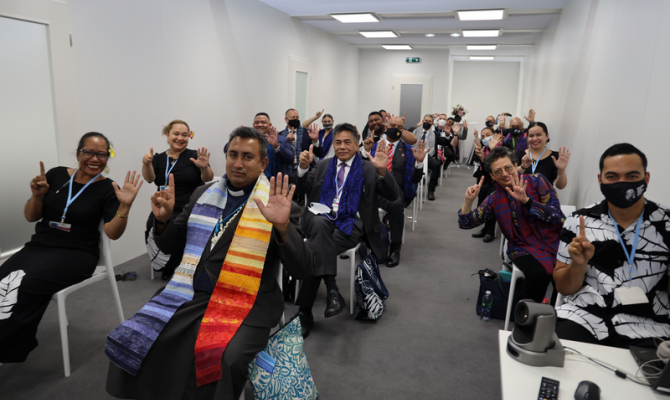The call that began years ago is to change from SIDS to Big Ocean Sovereign State or BOSS. “BOSS is not my term; I am borrowing it for others.”
Redefining what or how we call ourselves in Oceania has been an ongoing topic of conversation among Pacific Island leaders – but more so among those who work in regional organisations and the civil society space.
In preparation for the United Nations Climate Change Conference or COP26 that gets underway this Sunday, the call to redefine ourselves has come up yet again.
This time from Palau.
During a session with regional media organisations, Tutti Chilton, the Steering Committee Chair, Regional Pacific NDC Hub said it’s time that we started redefining who we are in Oceania rather than just letting others do it.
He was referring to the categorisation of most Pacific island countries as Small Island Developing States (SIDS) under the United Nations umbrella.
SIDS are a distinct group of 38 UN
Member States and 20 Non-UN Members/Associate Members of United Nations regional commissions that face unique social, economic and environmental vulnerabilities.
Change from SIDS to Big Ocean Sovereign State or BOSS
The call that began years ago is to change from SIDS to Big Ocean Sovereign State or BOSS.
“BOSS is not my term, I am borrowing it for others.”
Chilton noted that the earliest use of the term was found in a WWF Monitoring, Control and Surveil- lance (MCS) Emerging Technologies workshop report in 2014.
“I am sure with more research we can find earlier use but I found it appropriate that when describing Oceania, we are always SIDS and that is only because of others saying we need land to be defined. Our Oceans define us and we should not allow others to define us in a Small Island Develop- ing State (SIDS) box.
While there are likely protocols to follow to have a name change, Chilton remained adamant.
“I am not sure but I do not need permission from others to use the term to describe what I see in Oceania or Pacific or the region you are from. Again, protocol and local situations will define what you can and cannot use, but because I have the opportunity to work with the NDC Hub I can at least help shape the dialogue going forward in how we describe our situations and how we want to move for- ward to address it.
Chilton is the Executive Director of the Palau Energy Administration.
But he is an educator and taught for 15 years at the Palau Community College and two years as the Dean of Academic Affairs.
He also holds a strong background is social work and political science, specifically the Future Studies pro-
gramme at the Political Science Department at University of Hawaii, Manoa.
“I am a firm believer in planting seeds and waiting for them to grow.
Media
So, this platform with journalist, BOSS and Climate Crisis seems like a good use in hopes that it will be used in your stories, questions, articles and research. The media is the 4th branch of government along with the Executive, Legislative and Judicial to keep the government honest, trans- parent and working for the needs of the people.”
Chilton also encouraged the media to start using ‘climate crisis’ in references associated with climate change.
“Yes, there are ‘protocols’, there are our national governments and our leaders. But sometimes we need to question them and ourselves.
“This is where we need to remind everyone of our climate crisis, it is no longer a change that we need to pre- pare for but a crisis that we need to deal with everyday especially, on our islands.
“Therefore, I want to start using the word ‘crisis’ to highlight not just is- land vulnerabilities but also our ability to plan and adapt to our changing environment towards food, water and energy security.”
Expectation at COP26
Chilton is hopeful that Oceania will present its case and also finds financial support to really move us to- wards a fossil fuel free Oceania.
“At the same time to realise we need true partners who are willing to help us because we can not do it on our own as well as find strength and sup- port from each other and not be put in the middle of other people’s politics.
“Finally, I hope that Oceania realises that no matter the moral leadership, that some people have no morals at all so we need to focus on ourselves and prepare for the future with adaptation policies and practices and with the support and help of the Pacific NDC Hub, I think we have a good chance of moving forward.”
The Regional Pacific Nationally Determined Contribution (NDC) Hub supports 14 Pacific Island Countries and Territories (PICTs) in implementing, enhancing and financing their Nationally Determined Contributions (NDCs) to meet their commitments under the 2015 Paris Agreement.
Last week the Hub held a three-day workshop for regional media representatives with the aim to engage and keep them informed through robust communication and participation.
This story was produced by Rosi Doviverata, published at Fiji Sun on 25 October 2021, reposted via PACNEWS.




